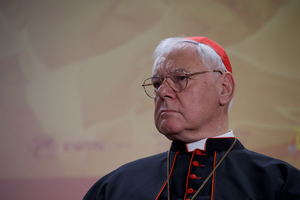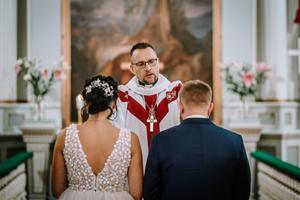Venezuela on the Brink
Church leaders appeal to President Maduro for political restraint.

CARACAS, Venezuela — Relations between Venezuela’s President Nicolás Maduro and the Catholic Church reached a low ebb in early August, after the Vatican strongly criticized the socialist regime’s plan to rewrite the nation’s constitution.
Maduro, whose policies have prompted an economic collapse and civil unrest, immediately hit back, accusing the Vatican of “violence” against his government and Venezuela as a whole.
The country’s bishops, with Vatican backing, have been regularly speaking out against the government, and most recently cited potential fraud in recent elections for a constituent assembly and expressed concern over the “moral degradation” in the country.
The assembly, which opened July 31 after it was elected the day before by a vote widely condemned as fraudulent, is expected to give Maduro dictatorial powers and the capacity to shut down the opposition, which has vowed they will only be removed by force.
In response, the Vatican issued an urgent appeal to Venezuela’s leaders Aug. 4, calling on them to suspend the assembly and saying it threatened the future of the Latin American nation.
Expressing its “profound concern for the radicalization and worsening of the crisis,” including the increase in deaths, injuries and arrests of protesters, the Vatican called on all of the country’s politicians, and especially the government, to guarantee “full respect for human rights and basic freedoms, as well as for the existing constitution.”
‘Climate of Conflict’
The appeal advocated suspending such initiatives as the constituent assembly, as they “foment a climate of tension and conflict,” which “mortgages the future” of the country rather than fostering reconciliation and peace.
The Aug. 4 statement also called for a negotiated solution, as outlined in a Sept. 1, 2016, letter from the Vatican secretary of state, taking into account “the serious suffering of the people” due to a lack of security, as well as the shortages of food and medicine.
It concluded by calling on all to avoid violence or an excessive use of force and assuring Venezuelans of Pope Francis’ prayers. The Vatican also invited people worldwide to pray for the country at this moment of crisis.
The following day, Aug. 5, Maduro told an Argentine radio station the Vatican statement was “regrettable” and that it had succumbed to “violence against the Bolivarian Revolution, Venezuela’s legitimate government and Venezuela as a whole.”
“The hierarchy of the Catholic Church in the country has traditionally been allied to the sectors that held onto powers and privileges and destroyed the country for almost a century,” Maduro said.
He then sought to distinguish what he saw as “Catholics, the people of Christ”; the person of Pope Francis, who defends “peoples with his humility”; and the “very different” structure of the Vatican’s Secretariat of State, “the bureaucracy.”
He also criticized the country’s bishops for being “militants” of the opposition and accused them of not being shepherds of all, but just “one political sector of society.”
‘Feigned Dialogue’
In May, Maduro criticized the bishops for allegedly ignoring Pope Francis’ repeated calls for dialogue and refusing to support the rewriting of Venezuela’s constitution.
Bishop José Luis Azuaje Ayala of Barinas, vice president of the Venezuelan bishops’ conference, told Catholic News Agency Aug. 8 that the government has only undertaken a “feigned dialogue” that has reaped no results.
“Whenever this government has been at a disadvantage, it has asked to dialogue; but it is always the same script: Dialogue is used to gain time and advance in the hegemonic project of totalitarianism and greater power of domination,” he said.
Some Venezuelans have welcomed the measured approach the Pope and the Holy See have taken and their emphasis on dialogue, but critics say that, compared to the bishops, they have been naïve, have trusted Maduro too much, and been too reticent to condemn the repressive regime. This has reportedly led some in the opposition to lose confidence in Pope Francis’ peacemaking efforts.
Since the Vatican’s latest statement, although many have said it was “too little too late, most Venezuelans have expressed newfound support for Pope Francis,” said Oscar Schlenker, Deutsche Welle’s correspondent in Caracas. He said society and politicians “are aware there is an evident divide between the Venezuelan Episcopal Conference (CEV) and the Holy See.”
In early June, six Venezuelan bishops met the Pope in an effort to find a solution and way forward.
“The Holy See has always been aware of what is happening in the country,” said Bishop Azuaje. “They have always been willing to mediate, and we thank them for that. But experiences teach. The failed dialogue from October to December has taught that governments like this should have something more than goodwill.”
121 People Killed
Bishop Azuaje said 121 people had been killed as a result of the violence, and, of them, 25% had been murdered by state security agencies and 40% by groups of armed civilians sympathetic to the regime.
Just over the past three months, more than 1,500 people have been wounded and thousands detained, giving a “hellish picture that would make any person or institution worried about the lives of citizens at stake,” the bishop added.
This disorder and violence is compounded by the shortage of basic products such as food and medicines, which “is the result of dire governmental policies, of improvisation, of wanting to establish a socialism without humanist support, and in its place generating a permanent conflict plagued by corruption and violence,” Bishop Azuaje said.
For the bishop, the real solution involves a “total change of government through general elections,” perhaps beginning with a “possible transitional national government.”
But he noted that “we cannot forget justice” because “there has been a lot of corruption and violence,” and “those responsible for this cannot be left uninvestigated.”
Schlenker said most polls show that Maduro and his government have less than a 20% approval rating, and even those polls aligned with the government have ratings just “slightly above” that figure.
Read Oscar Schlenker's full account of the situation on the ground here.
Edward Pentin is the Register’s Rome correspondent.
- Keywords:
- edward pentin
- holy see
- venezuela crisis


















